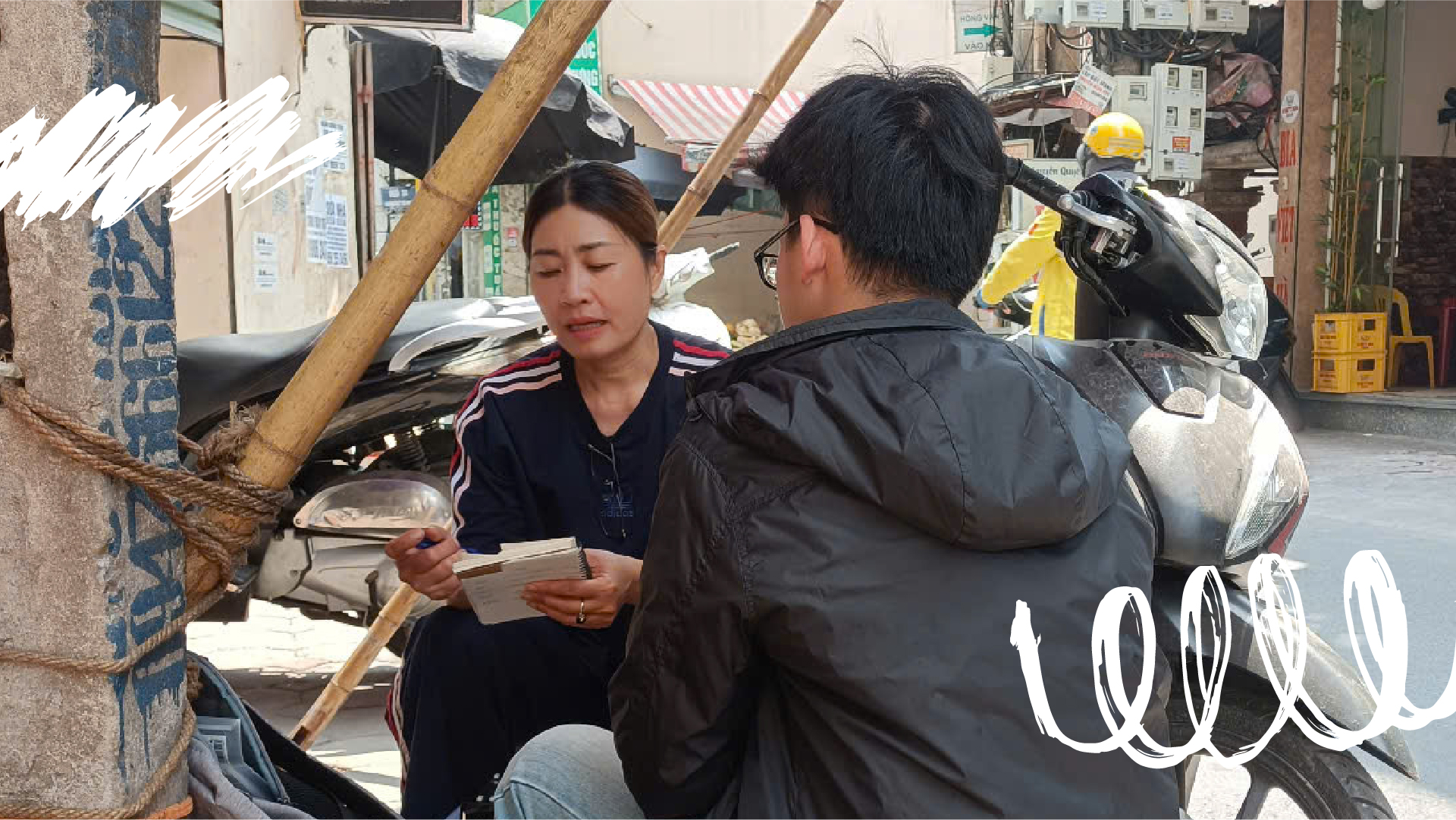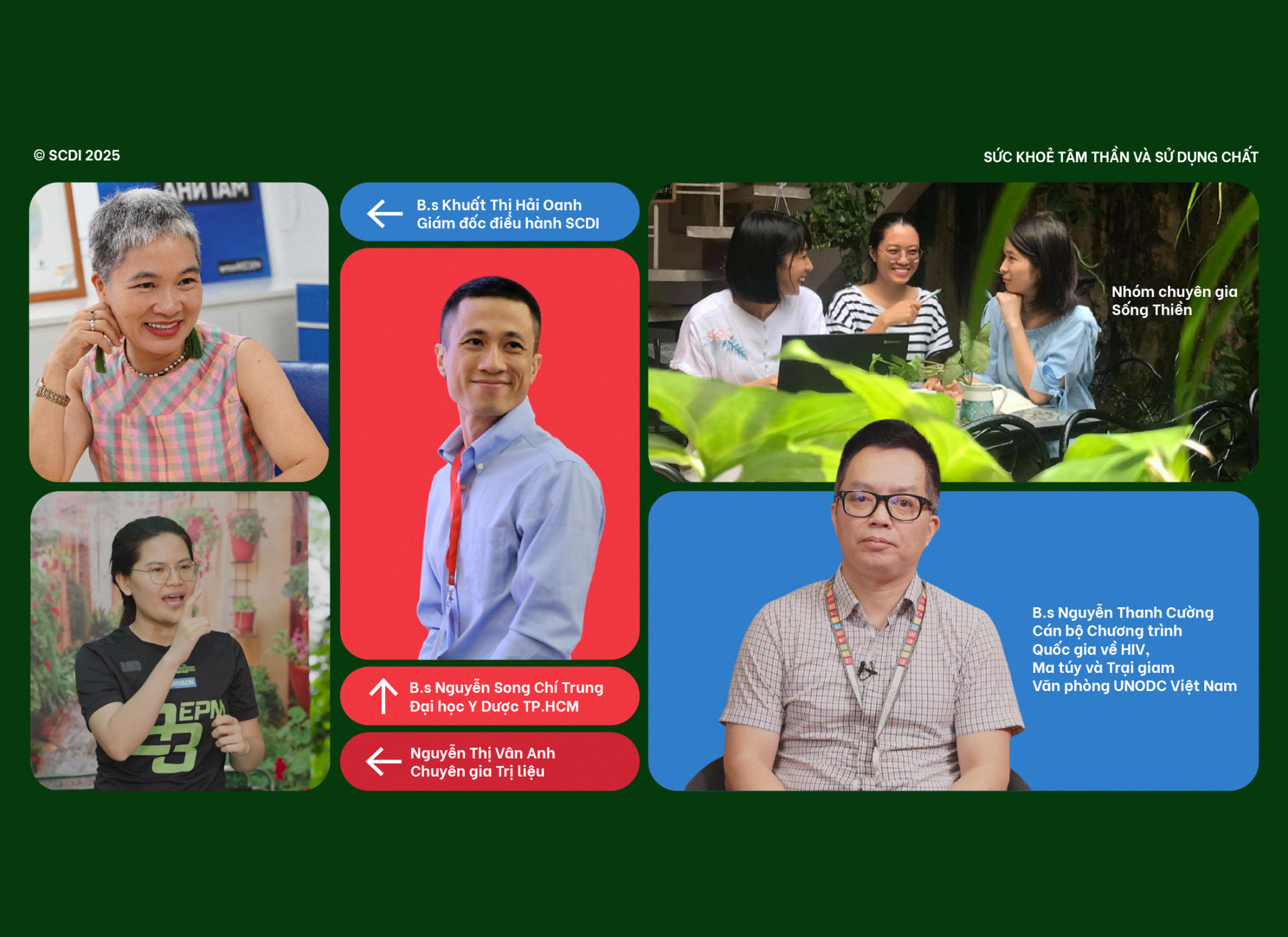The "New normal" of methadone patients

A 'not so' normal day - The myriad difficulties and stories of daily methadone dosing
The day of Pham Dinh Thi, leader of Ban Mai Xanh (Dien Bien) - the support group for drug users, starts at 7 o'clock in the morning. After his morning routine of brushing his teeth and washing his face, he rides his motorbike to the methadone clinic about 2 kilometres from home. This has become a steadfast habit since he began the methadone maintenance program in 2011. Rain or shine, weekday or holiday, every single day, Thi makes the trip to the facility to take methadone.
Drug addiction treatment with methadone substitution has helped not only Thi but nearly 53,000 patients nationwide escape dependence on opioid substances (heroin is one of them). After ten years of complying with treatment, Thi's life is more stable but has not ultimately returned to normal due to the requirement of taking methadone every day. When Vietnam piloted the project of multiday dose methadone to patients in April 2021, Thi once again had the opportunity to get closer to the everyday life he had always wished for.
Drug addiction treatment with methadone substitution has helped not only Thi but nearly 53,000 patients nationwide escape dependence on opioid substances (heroin is one of them). After ten years of complying with treatment, Thi's life is more stable but has not ultimately returned to normal due to the requirement of taking methadone every day. When Vietnam piloted the project of multiday dose methadone to patients in April 2021, Thi once again had the opportunity to get closer to the everyday life he had always wished for.

Part of Thi's daily job is to organize communication sessions on harm reduction for drug use.
“Honestly, I was a bit unfamiliar during the first days of being able to bring medicine home and not having to rush to the medical facility in the morning (laughs). It feels awkward, as if a routine was missing from my life. Because taking methadone has become a habit for me for ten years," he shared.
Though familiar, having to go to a medical facility to take methadone every day sometimes caused him sad, funny, and occasionally sad situations.
In 2019, a motorbike accident left Thi with fractured ribs and collarbone, and he had to be hospitalized. During the emergency, methadone was delivered to the hospital. But when he returned home for outpatient treatment, every morning Mr. Thi still had to ask his relatives to take him to the facility to take the medicine. Because at that time, there was no mechanism or instructions for dispensing multiday dose methadone to patients. The accident also left Thi with many complications.“Spine spurs started forming last October, making every move extremely painful for me. It was agonizing to wake up in the morning, and I still had to take methadone daily. I could only dare to ride a motorbike at a low speed of 5-10km/h. My whole body cringed whenever I hit a bump as the spine pressed on the nerve roots and muscles.”Being prescribed methadone for several days seemed to become a lifeline, dispelling his relentless physical pain and giving him hope.
Though familiar, having to go to a medical facility to take methadone every day sometimes caused him sad, funny, and occasionally sad situations.
In 2019, a motorbike accident left Thi with fractured ribs and collarbone, and he had to be hospitalized. During the emergency, methadone was delivered to the hospital. But when he returned home for outpatient treatment, every morning Mr. Thi still had to ask his relatives to take him to the facility to take the medicine. Because at that time, there was no mechanism or instructions for dispensing multiday dose methadone to patients. The accident also left Thi with many complications.“Spine spurs started forming last October, making every move extremely painful for me. It was agonizing to wake up in the morning, and I still had to take methadone daily. I could only dare to ride a motorbike at a low speed of 5-10km/h. My whole body cringed whenever I hit a bump as the spine pressed on the nerve roots and muscles.”Being prescribed methadone for several days seemed to become a lifeline, dispelling his relentless physical pain and giving him hope.
Being able to take methadone home every day makes me feel better and less miserable because I used to have to travel a lot before

“The dosing hours at methadone clinics are also different, but they will only be available during certain hours in the morning. Like where I go to take methadone, the time is from 7:15 a.m. to 10:00 a.m. But in other communes, it is very short, only within an hour from 8:30 to 9:30.". Nor is there flexibility in timing for patients at all drug administration locations. He and other patients were once refused to take methadone because they arrived later than the prescribed time. “If you can't take methadone that day, it's considered a day off of treatment. Mildly, you feel uncomfortable and tired. In worse cases, some people are very miserable waiting until the next day." The methadone clinic's predetermined dosing schedule may be suitable for some patients, but it also makes it difficult for many people to find work with suitable hours or receive understanding from employers and employees.
“For example, if we work as porters or workers at the factory, we have to be there at 7:30 a.m. But we have to wait until 7:15 a.m. to start taking methadone and are able to get to work at 8 a.m. at the earliest. Not all employers are sympathetic enough to create favourable conditions for us. Not to mention the people who work with us will also be jealous of why we are allowed to come late. Working fewer hours also affects income with jobs that pay by the hour," he shared. In addition to the issue of time, distance and transportation are also concerns of many methadone patients: "Anyone with a motorbike can get around, but most methadone patients have difficulty, so some have to cycle, some walk. If you can hitchhike, you can go for a ride; if not, travelling ten kilometres daily will be a big deal..." Thi shared.
“For example, if we work as porters or workers at the factory, we have to be there at 7:30 a.m. But we have to wait until 7:15 a.m. to start taking methadone and are able to get to work at 8 a.m. at the earliest. Not all employers are sympathetic enough to create favourable conditions for us. Not to mention the people who work with us will also be jealous of why we are allowed to come late. Working fewer hours also affects income with jobs that pay by the hour," he shared. In addition to the issue of time, distance and transportation are also concerns of many methadone patients: "Anyone with a motorbike can get around, but most methadone patients have difficulty, so some have to cycle, some walk. If you can hitchhike, you can go for a ride; if not, travelling ten kilometres daily will be a big deal..." Thi shared.
New life: whole of new things and full of joy
For Thi, the feelings of those early days are still intact, whether it was ten years ago when he started methadone treatment or now when he was the first to participate in the multiday methadone pilot in Dien Bien. “Every day when I went to the methadone clinic, I asked the staff there when the take-home methadone program would be implemented in Dien Bien. I looked forward to each day, just like ten years ago, waiting for my name to be on the list to take methadone. At that time, I was eager to learn how to quit drugs (with methadone) because before that, I wanted to quit many times but couldn't. I felt like a small child waiting for my mother to come home from the market (laughs)!”. On May 5, Thi completed the first month by taking methadone home for one day. With good treatment compliance, he was able to continue taking methadone home but for a more extended period of two days.
.png)

.png)
“I have just got back from taking methadone home. Holding the doses for two days in my hand; I feel even happier than last month. Because it feels like what I wish for is really about to come true.”. Every month, after successfully taking methadone home and following the program's regulations, Thi and his friends will be advised by the doctor to prescribe an extra day of methadone dispensing. “When I take methadone home, I feel like life is more relaxing. You don't have to rush to the clinics; you have time to eat breakfast. In the past, sometimes, I would deliberately go late to let my brothers, who had to go to work early, drink first to avoid crowds. Now there's no need for that anymore.”, shared Thi.
Besides the joy, Thi also realized the challenges of getting used to a new pace of life. “Sometimes I don't remember that day is the day I have to go to the medical facility to take methadone. Last month, I came once every other day; now, it's every other two days. There was also one day in the afternoon when I felt uncomfortable and tired, I realized I forgot to take my medicine.", shared Thi. "Fortunately, my wife sees that, so she often asks questions when it's time to take medicine or when it's time to take methadone. Having a wife who cares makes me feel secure, and I will forget less (laughs).". Thi also began to record the problems he encountered in the process of bringing methadone home along with his own solutions so that he could share with friends participating in the pilot program in the following months. “For example, to avoid forgetting to take methadone, when I wake up in the morning, I will check my medicine bag to see which methadone bottle I took and which day I have left. I also tell my wife the day I take methadone so she can remind me in case I forget."
Besides the joy, Thi also realized the challenges of getting used to a new pace of life. “Sometimes I don't remember that day is the day I have to go to the medical facility to take methadone. Last month, I came once every other day; now, it's every other two days. There was also one day in the afternoon when I felt uncomfortable and tired, I realized I forgot to take my medicine.", shared Thi. "Fortunately, my wife sees that, so she often asks questions when it's time to take medicine or when it's time to take methadone. Having a wife who cares makes me feel secure, and I will forget less (laughs).". Thi also began to record the problems he encountered in the process of bringing methadone home along with his own solutions so that he could share with friends participating in the pilot program in the following months. “For example, to avoid forgetting to take methadone, when I wake up in the morning, I will check my medicine bag to see which methadone bottle I took and which day I have left. I also tell my wife the day I take methadone so she can remind me in case I forget."
Ordinary days are not far away
Things like forgetting to take methadone, forgetting the day to take methadone, and someone else taking the wrong medication... are all things that can arise when dispensing multiday methadone to all patients everywhere, not only in Dien Bien or Vietnam.
Therefore, it is necessary to create four "layers of protection" to help implement a program that is safe for everyone and not too strict for patients. It is a combination of doctors - patients - families, and communities. Doctors care, monitor, and give specific advice to patients when they encounter problems in the spirit of finding solutions together. Patients themselves need to clearly understand the program's regulations and voluntarily comply with them for their own health benefits and to protect those around them, for example, by storing methadone bottles in a high place to avoid children from playing with them and mistakenly drinking it because he thought it was a soft drink. The next layer of protection is the family, who plays an extremely important role in creating conditions, supporting as well as providing mental and emotional support so that the patient is not alone and the process of taking methadone home will also go much more smoothly. The fourth layer of protection is the cooperation of the community and, specifically, of local support groups for people who use drugs.
Therefore, it is necessary to create four "layers of protection" to help implement a program that is safe for everyone and not too strict for patients. It is a combination of doctors - patients - families, and communities. Doctors care, monitor, and give specific advice to patients when they encounter problems in the spirit of finding solutions together. Patients themselves need to clearly understand the program's regulations and voluntarily comply with them for their own health benefits and to protect those around them, for example, by storing methadone bottles in a high place to avoid children from playing with them and mistakenly drinking it because he thought it was a soft drink. The next layer of protection is the family, who plays an extremely important role in creating conditions, supporting as well as providing mental and emotional support so that the patient is not alone and the process of taking methadone home will also go much more smoothly. The fourth layer of protection is the cooperation of the community and, specifically, of local support groups for people who use drugs.

Thi shared that the Ban Mai Xanh group was trained on treatment compliance support in December 2020.
In the coming time, he and the whole team will support patients participating in the pilot program in Dien Bien so that everyone can achieve the goal of treatment compliance when taking methadone home. With many years of experience, the team has also been implementing preventive activities and drug overdose rescue.
Having supported many people in the area with issues related to drug addiction, Thi has found that the majority of heroin addicts who participate in methadone treatment have had positive changes, especially in their lifestyle. Many patients no longer use drugs, so their minds are more alert, and their thoughts are more relaxed. The number of law violations, such as theft, has also decreased. Although many people still have difficulty finding work, most can return to being faithful family members, no longer being considered “useless," like when they were addicted. Their confidence has been further strengthened, especially for patients selected to participate in the first pilot phase like Thi.
Thi could not hide his joy when talking about the fathers, mothers, and wives of his friends at the methadone clinics. They met each other and chatted idly on an early April afternoon when patients and family members were invited to the methadone facility for consultation and received notification that their children had been selected for a pilot program allowing them to take methadone home for multiple days. Perhaps being able to take methadone home is meaningful to the patients not only in terms of social integration but also frees their whole family from the stigma of "having an addict in the family." Relieving this burden will require more understanding and sympathy from the wider community to bring lasting happiness to these families.
Having supported many people in the area with issues related to drug addiction, Thi has found that the majority of heroin addicts who participate in methadone treatment have had positive changes, especially in their lifestyle. Many patients no longer use drugs, so their minds are more alert, and their thoughts are more relaxed. The number of law violations, such as theft, has also decreased. Although many people still have difficulty finding work, most can return to being faithful family members, no longer being considered “useless," like when they were addicted. Their confidence has been further strengthened, especially for patients selected to participate in the first pilot phase like Thi.
Thi could not hide his joy when talking about the fathers, mothers, and wives of his friends at the methadone clinics. They met each other and chatted idly on an early April afternoon when patients and family members were invited to the methadone facility for consultation and received notification that their children had been selected for a pilot program allowing them to take methadone home for multiple days. Perhaps being able to take methadone home is meaningful to the patients not only in terms of social integration but also frees their whole family from the stigma of "having an addict in the family." Relieving this burden will require more understanding and sympathy from the wider community to bring lasting happiness to these families.
I sincerely hope for the day when all methadone patients across the country can take methadone home.
"There were many people who felt sad when they had not been able to participate in the pilot program since the first months. I completely understand why people felt that way. But I also think that implementing slowly, divided into phases, will help all parties learn from experience and quickly overcome arising problems so that next month will be better than the previous month," Thi shared. "But when the doctor explained the selection criteria clearly and thoroughly, everyone immediately understood and even took it as motivation to strive!" Thi expressed. "I sincerely hope for the day when all methadone patients across the country can take methadone home to have the life everyone wants. So I realize how important my responsibility is to be the first to participate, to prove that taking methadone home is completely possible in Vietnam."
And we also believe so.
And we also believe so.
Methadone is a practical, feasible, and cost-effective solution for treating opioid addition. Methadone addiction treatment has been proven effective in helping patients reduce and eventually stop using illegal drugs. The pilot program for multi-day methadone dispensing was started in Dien Bien, Lai Chau, Hai Phong on April 5th, 2021, for one year with the participation of 2000 patients. SCDI has participated in the project implementation process as a technical consultant. SCDI has coordinated with self-help groups to support drug users in implementing community-based monitoring, supporting treatment adherence, and, most importantly, preventing and treating overdose. SCDI has sponsored a total of 150,000 methadone vials for the pilot program.




